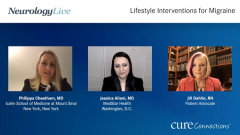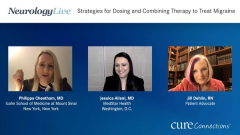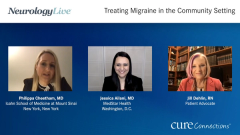
The Safety Profiles of Therapies for Migraine
The potential connection between risk of dementia in patients treated with triptans for migraine as compared to the safety profiles of newer CGRP monoclonal antibodies.
Episodes in this series

Philippa Cheetham, MD: We have talked a lot about the effect of migraine on patients’ quality of life—the pain, the distress, the down time. There appears to be more and more emerging discussions, debates, and possibly even evidence to support the idea that there may be an association between dementia and chronic migraine, or even the medications used to treat migraine, excessive triptan use. Do you have any comments on that?
Jessica Ailani, MD: There has not been any evidence that suggests that excessive triptan use can cause dementia. We do know that an excessive use of opioids or butalbital can change the way the brain functions and increase the ability to experience more pain. I think it causes a situation that is, in my mind, far worse than dementia, but I’m a headache specialist. You get more and more headaches, which you don’t forget, because with dementia at least you would forget you were having headaches. That is a terrible joke, but I really do not think of migraine as an easy disease to have.
There was an article many years ago that took a look at patients with brain changes and memory issues who had chronic migraine. The researchers found that there was not an association with Alzheimer disease and memory issues late in life after having migraine. More recently, in the last year, there was a publication at our annual neurology meeting that suggested that perhaps that is not true; perhaps there might be an association between long-term memory issues and frequent migraine. The fact that there is this controversy because there are articles and studies that suggest 2 different findings leads me to think that we are not really clear on whether there is an association between the 2 conditions, or if they travel together.
Philippa Cheetham, MD: Of course, we are hearing so much more in the neurology field about plaque deposition in the brain and chronic sleep disturbance. Many articles about how chronic sleep deprivation may predispose people to Alzheimer disease and dementia have been published and referenced in the media. Of course, when you think about the effects of rapid changes in blood flow, which are changes associated with migraines coming on, and then you consider the restriction of blood flow and the change in the chemistry of the brain, one cannot help but wonder if there are some long-term effects on memory, cognitive function, and neural networks. I am sure there is a lot more that we do not know than what we do know at the moment.
Jessica Ailani, MD: I am sure you are correct about that.
Philippa Cheetham, MD: Now, when you are counseling a patient about prevention, you have talked about some of the goalposts for the frequency of migraines and how to reduce those. Obviously, it is a subjective assessment for the patient, about the risks and benefits. What are the things that you warn patients about when you are counseling them about considering these newer medications, assuming that they are able to get these approved by their insurance?
Jessica Ailani, MD: We look at the adverse effects for the newer CGRP [calcitonin gene-related peptide] monoclonal antibodies. In general, these seem to be better tolerated by our patients. From the clinical trials and what is on the label for most of the medication, the most common adverse effects are injection site reactions for 3 of the medications: erenumab, fremanezumab, and galcanezumab. These are injection site reactions local to the area that a patient is injecting. They can start immediately after the injection, or what occurs and what I see more often in clinic, is that several days after the injection, redness and itching start at the site. It can be treated with local medication like Benadryl a diphenhydramine cream, or diphenhydramine oral medication at night. Sometimes, it can get pretty severe, and you can have a more widespread rash. In that case, we usually will stop treatment with that medication and consider switching to an alternative therapy.
Eptinezumab, which is the intravenous infusion medication, does not cause injection site reactions, which is nice. If a patient does have extensive injection site reactions, you can switch to that one. It does cause nasopharyngitis or a hypersensitivity reaction, which are things to watch for. It is also important to note that since erenumab was the first to market, it has had 2 label updates that are important. It can cause constipation, which can sometimes be very significant, and so that is something we need to watch for. More recently, the label update included a warning about hypertension, so for those with borderline hypertension we are very cautious about using erenumab. If we are going to start a patient on it, we usually check their blood pressure after that initial dose. It is important to note.
Philippa Cheetham, MD: Yes, that is very helpful information.
Thank you for watching NeurologyLive® Cure Connections®. If you enjoyed the program, please subscribe to our e-newsletter to receive upcoming programs and other great content right in your inbox. Thank you so much.
Transcript Edited for Clarity
Newsletter
Keep your finger on the pulse of neurology—subscribe to NeurologyLive for expert interviews, new data, and breakthrough treatment updates.





























